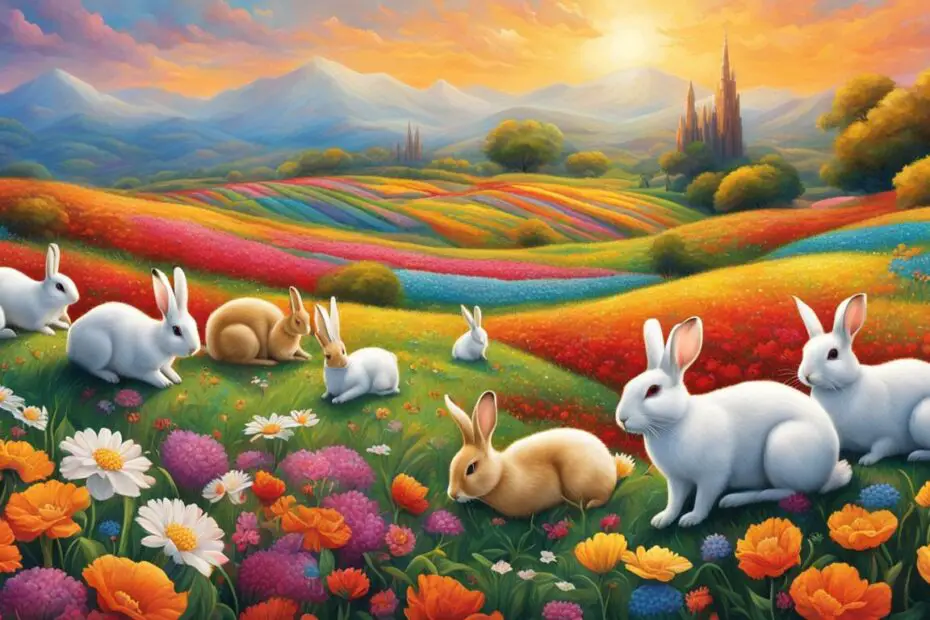Rabbits are one of the most symbolically rich creatures found all over the world. They hold significant meaning in various cultures and belief systems. From their association with fertility and new beginnings to their symbolism in literature, art, and spirituality, understanding rabbits’ symbolism can provide insight into different aspects of human culture and spirituality.
Key Takeaways:
- Rabbits symbolize fertility, new beginnings, and agility.
- They have diverse interpretations and universal appeal across cultures.
- Rabbits hold spiritual significance, representing purity and spiritual guidance.
- Their symbolism is prominent in literature, art, and popular culture.
- Understanding rabbits’ symbolism offers insights into the cultural and historical significance of these charming creatures.
17 Ways: How Does Rabbit Farming Make Money
Rabbits Symbolism
Here’s a friendly and informative table showcasing rabbit symbolism in different cultures and countries:
| Culture/Country | Symbolism | Description |
|---|---|---|
| General | Fertility and New Beginnings | Rabbits are universally recognized for their prolific breeding, symbolizing the flourishing of life and new opportunities. |
| North America | Good Luck | The rabbit’s foot is often carried as a charm, believed to bring good luck to the holder. |
| Asia | Moon Connection | In many Asian cultures, rabbits are associated with the moon, where legends often depict them as lunar creatures with various meanings, like immortality or purity. |
| Native American | Trickster | Rabbits in Native American tales often take the role of the trickster, teaching lessons through their clever and sometimes mischievous actions. |
| Christianity | Caution Against Covetousness | The Bible references rabbits in dietary laws, but some Christian interpretations also use the rabbit to symbolize the need to guard against desire and abundance. |
| Celtic | Intuition and Paradox | Rabbits, or hares in Celtic mythology, are seen as symbols of intuition due to their mysterious and paradoxical nature, as well as their connection to the earth and moon. |
| Japan | Good Fortune | Rabbits in Japan are often seen as symbols of good fortune and are also celebrated in folklore for their relation to the moon. |
| Africa | Cunning and Vigilance | African folklore often highlights the rabbit’s cunning and quick-witted nature, symbolizing the need to be vigilant and clever. |
| European | Prosperity and Protection | In European traditions, rabbits are sometimes associated with prosperity, abundance, and the protection of crops. |
| Egyptian | Fertility and the Cycle of Life and Death | Rabbits in ancient Egypt were connected to the cycle of life and death, partly due to their burrowing and emergence from underground. |
This table provides a snapshot of how the symbolism of rabbits plays an important role across various cultures, reflecting diverse beliefs and values.
Rabbit Symbolism in Different Cultures
Rabbits have symbolic significance in many cultures worldwide. Throughout history, these charming creatures have been associated with various meanings and beliefs. Let’s explore some of the cultural symbolism of rabbits:
Ancient Egypt
In Ancient Egypt, rabbits were considered lucky animals associated with the moon. They were believed to possess magical powers and were often depicted alongside lunar deities. The Egyptians saw these creatures as symbols of fertility, abundance, and new beginnings.
Native American Tribes
Native American tribes saw rabbits as symbols of fertility and communication with the spirit world. They believed that rabbits possessed a special connection to the Earth’s energies and were able to bring forth new life. Rabbits were often depicted in rituals and ceremonies to invoke blessings and abundance.
Chinese and Celtic Cultures
In Chinese and Celtic cultures, rabbits symbolized longevity, good fortune, growth, and new beginnings. In Chinese folklore, the “Moon Rabbit” is a mythical creature believed to reside on the moon, symbolizing harmony and prosperity. In Celtic mythology, rabbits were associated with the cycles of nature and the changing seasons.
Japanese Culture
In Japanese culture, rabbits symbolize good luck, ambition, and personal progress. They are often depicted alongside the moon, representing fertility and prosperity. The connection between rabbits and the moon reflects the belief in the transformative power of new beginnings and personal growth.
Conclusion
The diverse cultural interpretations of rabbit symbolism highlight the universal appeal and significance of these creatures. Whether associated with luck, fertility, growth, or spiritual guidance, rabbits hold a special place in the collective imagination of different cultures around the world.
Rabbit Symbolism in Literature and Media
Rabbits have long been a source of inspiration in literature and media, capturing the imagination of both young and old alike. These furry creatures often symbolize curiosity, adventure, and the journey into the unknown. One notable example of rabbit symbolism in literature is Lewis Carroll’s “Alice’s Adventures in Wonderland.” In this beloved tale, the white rabbit serves as a catalyst for Alice’s whimsical and transformative journey through Wonderland.
Another notable work that explores rabbit symbolism is Richard Adams’ “Watership Down.” This epic adventure follows a group of rabbits as they navigate the trials and tribulations of survival. The story portrays rabbits as intelligent and sensitive creatures, emphasizing the importance of community and the bonds between individuals.
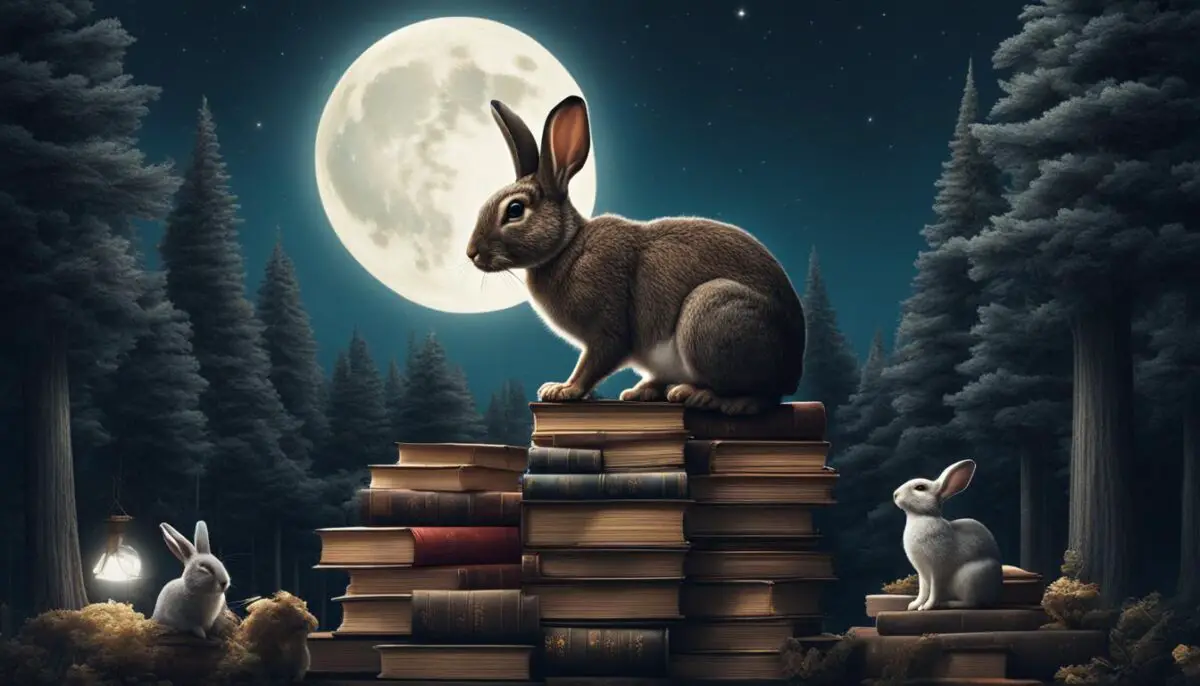
In addition to literature, rabbits also find their place in various forms of art. They are often associated with innocence, playfulness, and curiosity. Whether depicted in paintings or sculptures, rabbits add a touch of charm and whimsy to artistic expressions.
The Enduring Charm of Rabbits in Art and Literature
Rabbit symbolism in literature and art continues to captivate audiences across cultures and generations. These creatures represent a sense of wonder and adventure, inviting readers and viewers to embark on their own imaginative journeys. As symbols of curiosity, rabbits remind us to embrace our innate desire to explore the unknown and discover new possibilities.
By exploring the rich symbolism of rabbits in literature and art, we gain a deeper understanding of their significance in human culture and creativity. Through their portrayal in various forms of media, rabbits serve as powerful metaphors for the human experience, touching upon themes of growth, transformation, and the pursuit of knowledge.
Rabbit Symbolism in Literature and Art: A Source of Inspiration
The presence of rabbits in literature and art allows us to connect with the deeper meanings associated with these creatures. Their association with curiosity encourages us to question the world around us and seek new experiences. Through their depiction in art, rabbits evoke a sense of joy and playfulness, reminding us to embrace the childlike wonder within us.
The Symbolic Legacy of Rabbits in Literature and Art
Rabbit symbolism in literature and art has withstood the test of time, leaving an indelible mark on human storytelling and artistic expression. From the whimsical adventures of Alice in Wonderland to the profound journeys of rabbits in “Watership Down,” these creatures continue to inspire and enchant us. Their enduring presence serves as a reminder of the timeless themes and universal appeal of rabbit symbolism in literature and art.
Rabbit Symbolism in Spirituality and Religion
Rabbits hold symbolic significance in various spiritual and religious practices, representing a range of qualities and virtues. Across different faiths, rabbits symbolize spiritual guidance, purity, and the journey into the unknown.
| Spiritual Tradition | Symbolic Meaning of Rabbits |
|---|---|
| Christianity | In Christian symbolism, rabbits represent rebirth, resurrection, and fertility. They are especially associated with Easter celebrations, signifying new life and the rejuvenation of the spirit. |
| Buddhism | Rabbits are seen as symbols of kindness, compassion, and selflessness in Buddhism. The story of a rabbit offering itself as food to a hungry traveler illustrates these qualities. |
| Paganism | In Paganism, rabbits are considered creatures with magical powers and are connected to the moon and the spiritual realm. They are seen as symbols of intuition, fertility, and transformation. |
| Shamanism | In Shamanism, rabbits are associated with intuition, fertility, and transformation. Their ability to navigate both the physical and spiritual realms makes them spiritual guides. |
These diverse interpretations of rabbit symbolism highlight the universal appeal and significance of these creatures in the realm of spirituality and religion. Whether representing rebirth and resurrection, compassion and selflessness, or intuition and transformation, rabbits offer valuable insights into the spiritual journey and the exploration of the unknown.
Rabbit Symbolism in Dreams
Dreams have long been seen as a window into our subconscious, providing insight into our thoughts, emotions, and desires. When it comes to rabbits in dreams, their symbolism can vary depending on cultural backgrounds and personal experiences. Generally, seeing a rabbit in a dream represents fertility, abundance, and new beginnings. It signifies the potential for growth and the arrival of new opportunities in your life.
However, the specific actions of the rabbit in the dream can offer additional meanings. A fleeing rabbit may symbolize fear or a desire to escape a situation that is overwhelming or causing anxiety. It could be an indication that you need to confront your fears and find the courage to move forward. On the other hand, a hopping or playing rabbit can represent happiness, freedom, and joy. It suggests that you are embracing a carefree and lighthearted approach to life.
Just as dreams are deeply personal, the interpretation of rabbit symbolism may also be influenced by cultural beliefs and personal associations. It is important to reflect on your own experiences and emotions connected to rabbits to gain a deeper understanding of what they represent to you personally. Some individuals may have positive associations with rabbits based on their cultural background or personal experiences with these creatures, while others may view them in a more neutral or even negative light. Ultimately, the interpretation of rabbit symbolism in dreams is highly subjective and should be explored in the broader context of your own life.
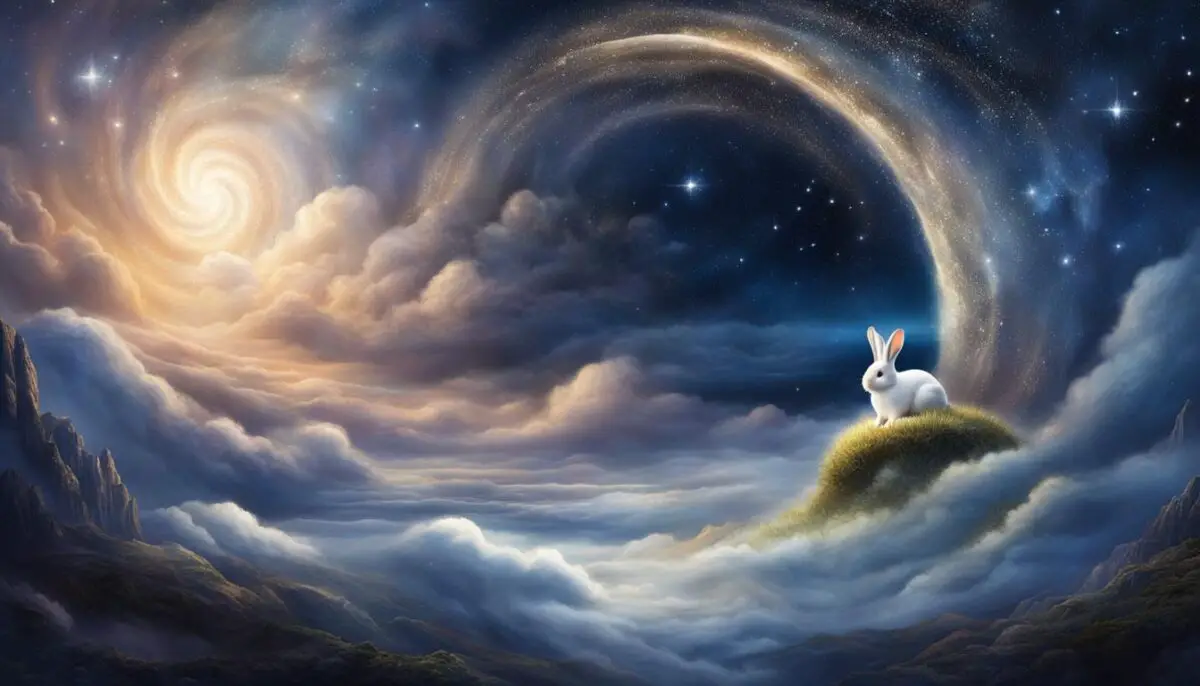
Key Takeaways:
- Rabbits in dreams symbolize fertility, abundance, and new beginnings.
- A fleeing rabbit may represent fear or a need to escape a challenging situation.
- A hopping or playing rabbit signifies happiness, freedom, and a carefree approach to life.
- Interpretations of rabbit symbolism in dreams can vary based on personal experiences and cultural beliefs.
Rabbit Symbolism in Art and Design
Rabbits have long been a popular motif in art and design, evoking feelings of joy, innocence, and playfulness. Their symbolism is present in various cultural contexts, showcasing the universal appeal of these charming creatures. In both Eastern and Western art, rabbits are commonly associated with positive qualities and themes of growth and new beginnings.
Table: Rabbit Motifs in Art and Design
| Artistic Style | Symbolic Meaning |
|---|---|
| Chinese Art | Rabbits are often depicted alongside the moon and flowers, symbolizing harmony, prosperity, and longevity. |
| Western Art | Rabbits are frequently portrayed as innocent and curious creatures, embodying the spirit of exploration. |
These representations can be found in various forms of artistic expression, including paintings, sculptures, clothing, textile designs, and jewelry. Rabbit-inspired art brings a sense of whimsy and enchantment to both traditional and contemporary art scenes.
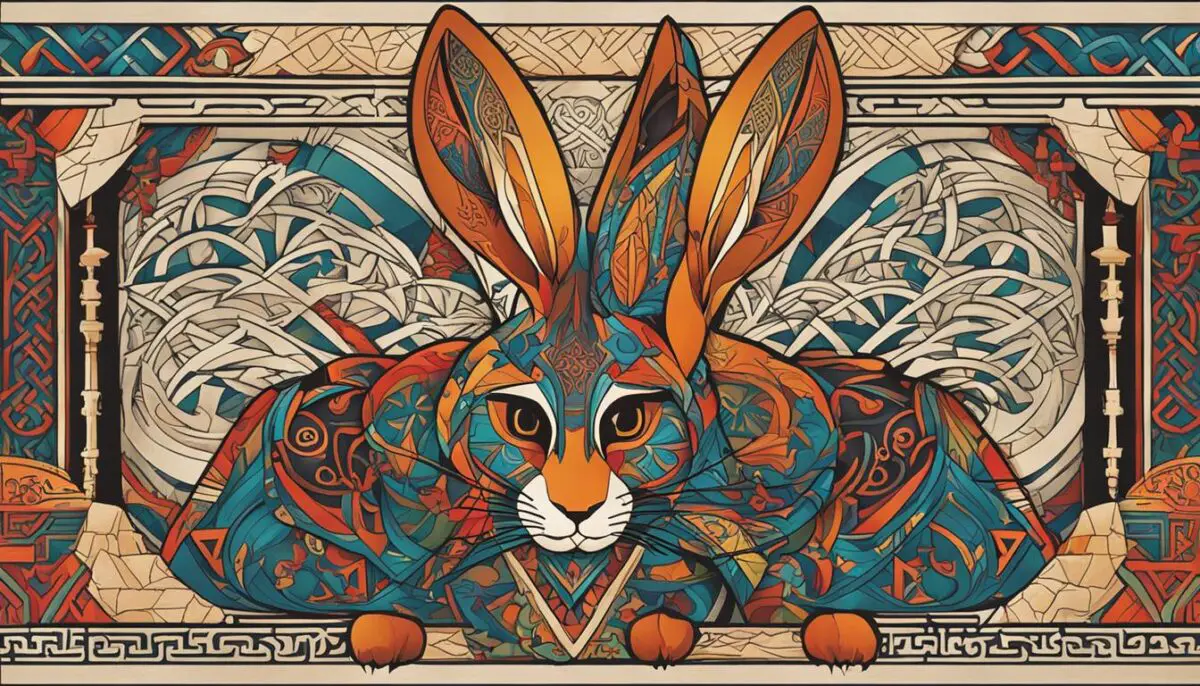
The Joy of Rabbit Motifs
Rabbit motifs often serve as visual reminders to embrace the joy and innocence found in everyday life. They inspire us to approach new endeavors with curiosity and a sense of playfulness. Whether incorporated into home decor, fashion statements, or personal accessories, rabbit symbolism in art and design adds a touch of whimsy and positivity to our surroundings.
Rabbit Symbolism in Folklore and Mythology
Rabbits have a long-standing presence in folklore and mythology, often portrayed as cunning tricksters with intelligence and resourcefulness. In many cultures, rabbits’ symbolism revolves around their ability to outwit their adversaries and overcome challenges through their quick thinking. These tales serve as cautionary stories, highlighting the power of wit and cleverness in navigating life’s obstacles.
“In Native American folklore, rabbits are often depicted as clever and mischievous animals, using their intelligence to outsmart others. Norse mythology introduces us to Br’er Rabbit, a trickster figure known for his quick thinking and resourcefulness. These stories illustrate the multifaceted nature of rabbits’ symbolism, showcasing their role as clever and cunning creatures.”
Rabbits’ reputation as tricksters is not limited to specific cultures but can be found across various mythologies and folk traditions. This recurring theme emphasizes the importance of wit, intelligence, and adaptability in navigating life’s challenges. The cultural significance of trickster rabbits reflects their enduring appeal as characters that embody cleverness and resourcefulness.
The Trickster Rabbit in Native American Folklore
In Native American cultures, the rabbit is often portrayed as an intelligent and mischievous trickster. Among various tribes, rabbits are known for using their cunning to outsmart predators and humans alike. These stories serve as cautionary tales, teaching lessons about the consequences of greed, arrogance, and underestimating others.
| Tribe | Rabbit in Folklore |
|---|---|
| Hopi | The Hopi people believe that the trickster rabbit, named Nanabush or Mooin, represents the balance between chaos and order. Nanabush often outwits other animals through his cleverness and quick thinking. |
| Cherokee | In Cherokee folklore, the rabbit, known as Unelanvhi or Rabbit Boy, is a well-known trickster figure. He is portrayed as mischievous and often uses his intelligence to outsmart larger and stronger animals. |
| Lakota | The Lakota Sioux attribute intelligence and cunning to the rabbit, featuring him in stories where he outsmarts predators and humans who underestimate his abilities. |
These stories show the important role of the trickster rabbit in Native American folklore, embodying the values of intelligence, adaptability, and the power of outsmarting others.biblical rabbits
Biblical References to Rabbits
The Bible does not frequently mention rabbits, but when they do appear, it is usually in a negative light. These animals are considered unclean and are forbidden to be eaten according to biblical dietary laws. For example, in Leviticus 11:6, rabbits are listed among the animals that should not be consumed. This negative association with rabbits stems from their status as herbivores that do not chew their cud, which was a requirement for animals to be considered clean for consumption.rabbit deities
Despite this, rabbits still hold symbolic significance in certain biblical contexts. Their association with fertility and new life has led to their connection with Easter celebrations in Christian traditions. The Easter Bunny, a popular figure associated with the holiday, is not explicitly mentioned in the Bible but has become an iconic symbol of rejuvenation and new beginnings. The image of the Easter Bunny delivering colored eggs is often seen as a representation of the rebirth and resurrection of Jesus Christ.rabbit path crossing
“He will restore your life and have mercy on you; he will deal with you kindly and bring you back from all the nations where he scattered you. Even if any of your people are scattered to the farthest corners of the earth, I will gather them from there and bring them to the place I have chosen as a dwelling for my Name.” – Nehemiah 1:9
Despite the limited biblical references to rabbits, their symbolism in popular culture and their association with Easter continue to be prevalent in Judeo-Christian mythology. The enduring connection between rabbits and concepts of fertility, new life, and rejuvenation serves as a reminder of the spiritual and symbolic depth that animals can hold even within religious contexts.trickster god
Rabbit Symbolism in Asian Cultures
Rabbits hold significant symbolic meaning in various Asian cultures, including Japanese, Buddhism, and Hinduism. In Japanese culture, rabbits are associated with good luck, personal progress, and ambition. They are often depicted alongside the moon, representing fertility and abundance. The Japanese also believe that rabbits have the ability to transform and gain magical powers. This belief is deeply rooted in Japanese folklore and art.
In Buddhism, rabbits symbolize kindness, compassion, and selflessness. One famous Buddhist story tells of a rabbit who offered itself as food to a hungry traveler, demonstrating the rabbit’s self-sacrifice and noble qualities. This story serves as a reminder of the importance of compassion and empathy in Buddhist teachings. Additionally, the rabbit is seen as a guardian of the souls in the afterlife.
In Hinduism, rabbits are associated with intelligence, fertility, and abundance. They are revered as sacred animals and are believed to bring good fortune and prosperity. The rabbit is often depicted alongside gods and goddesses in Hindu mythology, representing their divine qualities. In some Hindu religious texts, the rabbit is mentioned as a vehicle or mount for deities, emphasizing its symbolic importance in the religion.
| Japanese Rabbit Lore | Rabbit Meaning in Buddhism | Rabbit Meaning in Hinduism |
|---|---|---|
| The rabbit is associated with good luck, personal progress, and ambition in Japanese culture. | Rabbits symbolize kindness, compassion, and selflessness in Buddhism. | Rabbits are associated with intelligence, fertility, and abundance in Hinduism. |
| The Japanese believe that rabbits have the ability to transform and gain magical powers. | The rabbit is seen as a guardian of the souls in the afterlife in Buddhism. | Rabbits are revered as sacred animals and bring good fortune and prosperity in Hinduism. |
| Rabbits are often depicted alongside the moon, representing fertility and abundance. | One famous Buddhist story tells of a rabbit who offered itself as food to a hungry traveler, emphasizing self-sacrifice. | Rabbits are depicted alongside gods and goddesses in Hindu mythology, representing their divine qualities. |
The Cultural Impact of Rabbit Symbolism
Rabbit symbolism has had a profound influence on various cultures, leaving a lasting impact on art, literature, and even body art. The cultural significance of rabbits can be seen in the popularity of rabbit tattoos, which represent fertility, new beginnings, and agility. These tattoos serve as personal expressions of the positive qualities associated with rabbits, such as creativity, speed, and adaptability. The enduring appeal of rabbit symbolism is evident in the continued association of rabbits with luck and good fortune.
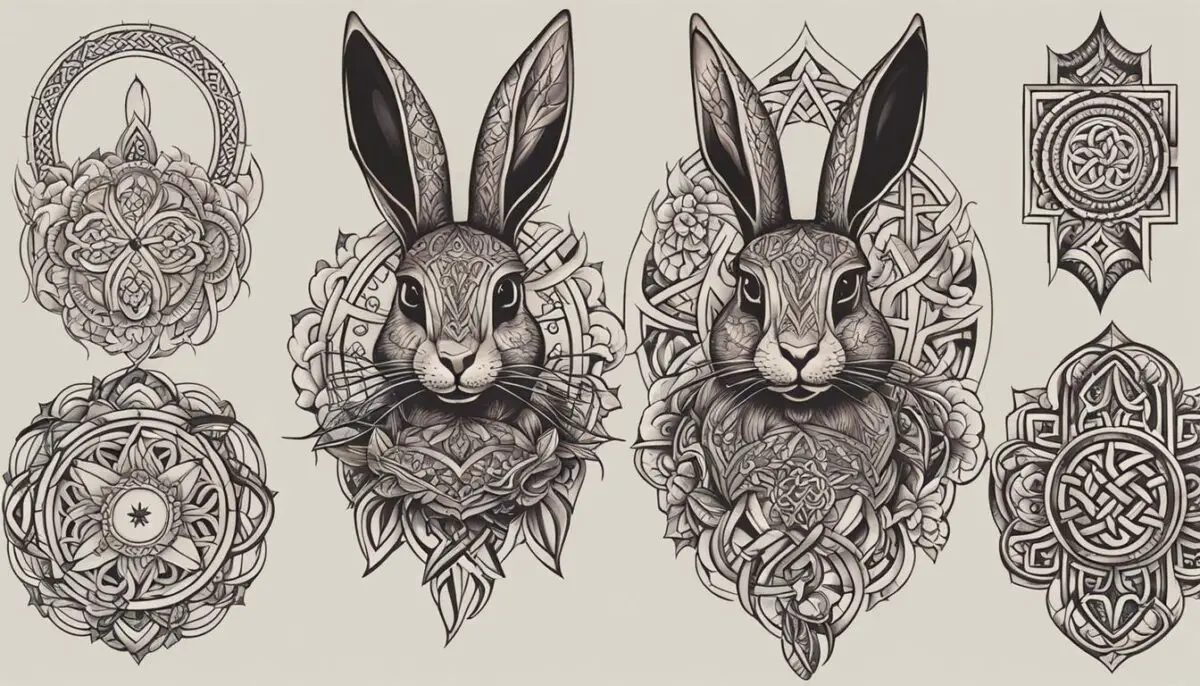
Rabbits’ cultural impact extends beyond tattoos. They have made their mark on popular culture, appearing in various forms of media, literature, and entertainment. Iconic characters like Bugs Bunny and Peter Rabbit have become synonymous with rabbits’ wit, resourcefulness, and playfulness. The universal appeal of rabbits’ symbolism is reflected in their recurring presence in popular culture, underscoring their enduring relevance and influence.
The Symbolism of Rabbits in Cultural Expressions:
- In literature and art, rabbits often symbolize innocence, curiosity, and the journey into the unknown.
- In spirituality and religion, rabbits represent rebirth, fertility, purity, and the connection between the human and spiritual realms.
- In folklore and mythology, rabbits are depicted as clever tricksters, using their intelligence and resourcefulness to outwit their adversaries.
- In dreams, rabbits symbolize fertility, abundance, new beginnings, and the pursuit of happiness.
The cultural impact of rabbit symbolism is evident in the diverse interpretations and representations found in different cultural expressions. Whether it is through tattoos, literature, art, or folklore, rabbits continue to captivate and inspire people, offering a glimpse into the profound and multifaceted aspects of human culture and spirituality.
Rabbit Symbolism in Dreams
Dreams often carry deep symbolic meanings, and rabbits make frequent appearances in the dream realm. Seeing a rabbit in a dream can have various interpretations, depending on cultural backgrounds and personal experiences. In general, rabbits symbolize fertility, abundance, and new beginnings, reflecting their associations with growth and reproduction. When a rabbit is spotted in a dream, it may signify the onset of a period of prosperity and creative energy, indicating that new opportunities and possibilities are on the horizon.
However, the specific actions of the rabbit in the dream can provide further insights into its meaning. A fleeing rabbit could represent fear or a desire to escape from a situation that feels overwhelming or threatening. On the other hand, a hopping rabbit suggests feelings of happiness, freedom, and spontaneity. It signifies a sense of lightness and joy, encouraging the dreamer to embrace life’s adventures with curiosity and enthusiasm.
It is important to note that dream interpretation is subjective, and different individuals may have unique associations and experiences with rabbits. To gain a deeper understanding of the personal significance of a rabbit dream, it can be helpful to reflect on one’s emotions and experiences during the dream, as well as any specific details that stood out. Understanding the symbolism of rabbits in dreams can provide valuable insights into one’s subconscious desires, fears, and aspirations.
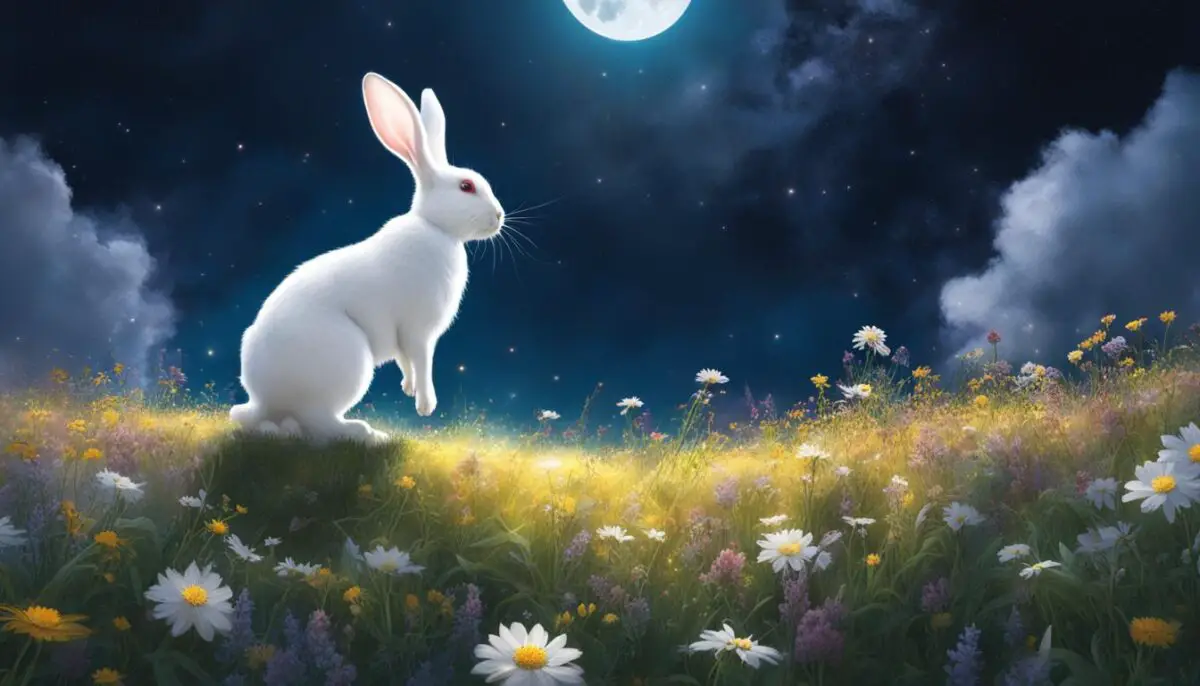
Table: Common Symbolic Interpretations of Rabbit Dreams
| Dream Action | Symbolic Interpretation |
|---|---|
| Fleeing Rabbit | Desire to escape a threatening or overwhelming situation |
| Hopping Rabbit | Feelings of happiness, freedom, and spontaneity |
| Multiple Rabbits | Abundance, fertility, and growth |
| Talking Rabbit | Insightful messages and guidance from the subconscious mind |
| Giant Rabbit | Overwhelming emotions or situations that may require attention |
Rabbit Tattoo Meaning
Rabbit tattoos have gained popularity in recent years due to the symbolism associated with these adorable creatures. The rabbit is often seen as a symbol of fertility, new beginnings, and agility, making it a meaningful choice for those seeking a tattoo design that represents personal growth and positive energy.
Symbolically, a rabbit tattoo can convey various ideas depending on the individual’s interpretation. For some, it may represent the ability to adapt and thrive in changing circumstances, symbolizing resilience and flexibility. The rabbit’s association with fertility can also be interpreted as a representation of creativity and the potential for new ideas and opportunities.
Additionally, the rabbit’s agility and quick movements can be seen as a metaphor for being nimble in navigating life’s challenges. The tattoo may serve as a reminder to stay light-hearted, playfully approach obstacles, and embrace positive change.rabbits symbolism
When choosing a rabbit tattoo design, individuals often personalize it to reflect their unique experiences and values. Some opt for realistic depictions of rabbits, while others incorporate elements such as flowers, moons, or other symbols to enhance the meaning of their tattoo. Ultimately, the significance of a rabbit tattoo lies in the individual’s personal connection to the symbolism it represents.rabbit symbolism in different cultures
Rabbit Symbolism in Mythology and Folklore
Rabbits have a prominent place in mythology and folklore worldwide, often depicted as clever and resourceful trickster figures. These tales highlight the intelligence and quick thinking associated with rabbits in various cultures. In Native American folklore, rabbits are portrayed as mischievous animals, using their wit to outsmart their adversaries. Norse mythology features Br’er Rabbit, a trickster rabbit known for his cunning and ability to find solutions to challenging situations.
One notable example of rabbit symbolism in mythology comes from the story of the Moon Rabbit in East Asian folklore. According to the legend, a rabbit on the moon pounds a mortar to create the elixir of immortality. This tale showcases the rabbit’s association with the moon and longevity in Chinese and Japanese cultures.rabbit symbolism in different cultures
In Native American folklore, rabbits are often portrayed as clever and mischievous animals.
In addition to being trickster figures, rabbits also symbolize fertility and abundance in folklore. Their ability to reproduce quickly has led to their association with fertility and new life in many cultures. The story of the Rabbit and the Moon, a popular Native American legend, explains how rabbits became associated with the moon and its cycles.
| Culture | Mythological Rabbit | Symbolism |
|---|---|---|
| Native American | Trickster Rabbit | Intelligence, wit, fertility |
| Norse | Br’er Rabbit | Resourcefulness, quick thinking |
| East Asian | Moon Rabbit | Longevity, immortality |
The presence of rabbits in mythology and folklore serves as a reminder of the importance of intelligence, resourcefulness, and adaptability in overcoming challenges and outwitting adversaries.
The Spiritual Significance of Rabbits
Rabbits hold a deep spiritual significance in various belief systems around the world. Their symbolism is associated with fertility, abundance, purity, and spiritual guidance. In different religions and spiritual practices, rabbits are often seen as messengers between the human and spiritual realms, bridging the gap between the physical and divine.hidden meanings of rabbits
In some cultures, rabbits are considered sacred creatures and even revered as deities. These divine rabbit figures embody wisdom, intuition, and mystical powers. They are seen as guides and protectors, offering spiritual guidance and blessings to those who seek their wisdom.
One example of a rabbit deity is the Moon Rabbit in East Asian folklore. This legendary creature is believed to reside on the moon, symbolizing longevity, wisdom, and the power of transformation. In Japanese culture, the Moon Rabbit represents good luck, ambition, and personal progress, reflecting the spiritual qualities associated with rabbits.
The Moon Rabbit in East Asian Culture
“The Moon Rabbit has long been a symbol of good fortune and personal growth in Japanese culture. It is believed that by observing the Moon Rabbit during the autumn moon festival, one can receive blessings for success and prosperity.”
The spiritual significance of rabbits extends beyond their association with specific deities. They are often seen as embodiments of purity and innocence, reminding individuals to cultivate these qualities within themselves. Rabbits are also symbols of fertility and new beginnings, representing the cycle of life and the potential for growth and transformation.rabbits as omens
The spiritual significance of rabbits can be observed in various rituals and practices. In some spiritual traditions, rabbits are invoked for their qualities of intuition, agility, and adaptability. They are seen as allies in navigating the unknown, providing guidance and support on the spiritual journey.rabbit’s foot
| Symbolism | Meaning |
|---|---|
| Fertility | Represents the cycle of life, new beginnings, and the potential for growth. |
| Guidance | Seen as messengers between the human and spiritual realms, providing direction and spiritual insights. |
| Purity and Innocence | Symbolizes the embodiment of innocence and reminds individuals to cultivate purity within themselves. |
| Wisdom and Intuition | Rabbits are associated with wisdom, intuition, and mystical powers in various cultures. |
As we explore the spiritual significance of rabbits, it becomes clear that these creatures hold a special place in the human collective consciousness. From their portrayal as deities to their representation of purity, fertility, and guidance, rabbits continue to inspire and captivate our spiritual imagination.wealth
Rabbit Symbolism in Popular Culture
Rabbits have become iconic figures in popular culture, appearing in various forms of media, literature, and entertainment. Their wit, resourcefulness, and playfulness have made them beloved characters that resonate with people of all ages. One of the most well-known rabbit characters is Bugs Bunny, the wise-cracking and quick-thinking rabbit from Looney Tunes. Bugs Bunny’s clever and mischievous personality has made him a cultural icon and a symbol of rabbits’ intelligence and wit.rabbit folklore
Another famous literary rabbit is Peter Rabbit, the mischievous and adventurous character created by Beatrix Potter. Peter Rabbit’s escapades in Mr. McGregor’s garden have captivated readers for generations and highlighted the playful and curious nature of rabbits. The popularity of Peter Rabbit has even inspired adaptations in movies and television shows, further solidifying rabbits’ impact on popular culture. three rabbits
“I’m late! I’m late! For a very important date!” – The White Rabbit, Alice’s Adventures in Wonderland
Aside from fictional characters, rabbits have also made their way into popular culture through their symbolic representation. In advertising, rabbits are often used to convey messages of fertility, abundance, and new beginnings. Their association with Easter and the Easter Bunny has further cemented their place in popular culture, as the Easter Bunny has become a beloved figure associated with the holiday’s joy and renewal.moon connection
Overall, rabbits’ presence in popular culture showcases the cultural impact and enduring appeal of these charming creatures. From iconic characters like Bugs Bunny and Peter Rabbit to their symbolic representation in advertising, rabbits continue to captivate audiences and inspire creativity across various forms of media. Their intelligence, playfulness, and association with positive qualities make them beloved and cherished figures in popular culture.eternity
Conclusion
Rabbits hold a rich cultural, historical, and spiritual significance in various cultures and belief systems worldwide. Their symbolism spans across different cultures, religions, literature, art, and popular culture, making them a universally recognized symbol. Understanding rabbits’ symbolism provides insight into themes of fertility, new beginnings, agility, innocence, and spiritual guidance.
The diverse interpretations of rabbits’ symbolism highlight the universal appeal these charming creatures have. From their association with luck and good fortune to their portrayal as trickster figures in folklore and mythology, rabbits embody qualities that resonate with people across different cultures. Furthermore, their presence in dreams and their symbolic significance in various religions further emphasize their importance as spiritual guides.
Whether it’s their portrayal in literature, art, or popular culture, rabbits continue to capture our imagination and evoke a sense of wonder. Characters like Bugs Bunny and Peter Rabbit have become iconic representations, showcasing the wit, resourcefulness, and playfulness associated with rabbits. Their enduring presence in pop culture reflects the timeless allure of rabbits’ symbolism.
Ultimately, understanding the significance of rabbits’ symbolism allows us to appreciate the depth and complexity of human culture and spirituality. These small creatures carry with them a multitude of meanings that transcend time and borders, making them a truly remarkable symbol that continues to captivate and inspire us.
FAQ
What is the symbolic meaning of rabbits?
Rabbits hold symbolic significance in various cultures and belief systems, representing fertility, new beginnings, innocence, agility, and spiritual guidance.
How are rabbits symbolized in different cultures?
In ancient Egypt, rabbits were considered lucky animals with magical powers. Native American tribes associated rabbits with fertility and communication with the spirit world. Chinese and Celtic cultures viewed rabbits as symbols of good fortune, longevity, growth, and new beginnings.
What is the role of rabbits in literature and media?
Rabbits often represent curiosity, adventure, and the journey into the unknown in literature and media. Characters like the white rabbit in “Alice’s Adventures in Wonderland” embody these characteristics.
What is the spiritual significance of rabbits?
Rabbits hold spiritual significance in various religious and spiritual practices. In Christianity, they symbolize rebirth, resurrection, and fertility. Buddhism associates rabbits with kindness, compassion, and selflessness. Paganism sees rabbits as creatures with magical powers connected to the moon and the spiritual realm.
What do rabbits symbolize in dreams?
Generally, seeing a rabbit in a dream represents fertility, abundance, and new beginnings. A fleeing rabbit may symbolize fear or a desire to escape, while a hopping rabbit indicates happiness and freedom.
How are rabbits symbolized in art and design?
Rabbits are often associated with joy, innocence, and playfulness in art and design. In Chinese art, they symbolize harmony, prosperity, and longevity when depicted alongside the moon and flowers.
What is the role of rabbits in folklore and mythology?
Rabbits are often portrayed as trickster figures in folklore and mythology, using their wit and cunning to outsmart their adversaries. They are recognized for their cleverness, resourcefulness, and ability to think quickly.
What is the relationship between rabbits and the Bible?
While the Bible does not mention rabbits frequently, they are considered unclean animals and forbidden to be eaten. However, rabbits’ association with fertility and new life has led to their connection with Easter celebrations in Christian traditions.
What do rabbits symbolize in Asian cultures?
In Japanese culture, rabbits symbolize good luck, ambition, and personal progress, often associated with the moon and fertility. Buddhism views rabbits as symbols of kindness, compassion, and selflessness. In Hinduism, they represent fertility, abundance, and intelligence.
What is the cultural impact of rabbit symbolism?
Rabbit symbolism has influenced various cultural aspects, including art, literature, and even body art. Rabbit tattoos are popular among those who resonate with the symbolism of fertility, new beginnings, and agility.
What is the meaning of rabbit tattoos?
Rabbit tattoos carry symbolic meanings associated with fertility, new beginnings, and agility. People who choose to adorn their bodies with rabbit tattoos often resonate with the positive qualities represented by these creatures, such as creativity, speed, and adaptability.
How do rabbits feature in mythology and folklore?
Rabbits are often depicted as trickster figures in mythology and folklore, known for their wisdom, cunning, and ability to outwit others. They serve as cautionary tales, teaching lessons about the power of intelligence and quick thinking.
What is the spiritual significance of rabbits?
Rabbits hold a spiritual significance in various belief systems, representing fertility, abundance, purity, and spiritual guidance. They are seen as messengers between the human and spiritual realms and are revered as sacred animals in some cultures.
How do rabbits influence popular culture?
Rabbits have made their mark on popular culture, appearing in various forms of media, literature, and entertainment. Characters like Bugs Bunny and Peter Rabbit have become iconic representations of rabbits’ wit, resourcefulness, and playfulness.
What is the symbolic meaning of rabbits?
Rabbits hold symbolic significance in various cultures and belief systems, representing fertility, new beginnings, innocence, agility, and spiritual guidance.
What is the significance of rabbits symbolism?
Understanding rabbits’ symbolism offers insights into the diverse interpretations and universal appeal of these charming creatures in human culture and spirituality.


